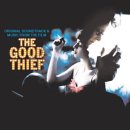Movie Wave Home
Reviews by Title | Reviews by Composer


Composed by
ELLIOT GOLDENTHAL
Rating
**
Album running time
63:36
Tracks
1: Minuit Cheb Khaled (5:51)
2: Lucky Eyes (2:42)
3: A Thousand Kisses Leonard Cohen (6:27)
4: Endorphin Spoon (2:30)
5: Verite Rachid Taha (6:07)
6: Ouverture Français (1:53)
7: Parisien du Nord Cheb Mami and K-Mel (3:30)
8: Snake 5 (3:11)
9: Noir c'est Noir Johnny Hallyday (3:14)
10: Waltz for Anna (1:39)
11: Flashback Intense (6:21)
12: 36 Hadjini Street (1:50)
13: Je t'aime... moi non plus Serge Gainsbourg and Jane Birkin (4:22)
14: Confession to JC with Love (1:17)
15: That's Life Bono (3:55)
16: Redemption Rehearsal (8:38)
Performed by
THE IRISH FILM ORCHESTRA
Conducted by
JAMES SHERMAN
and
THE LONDON METROPOLITAN ORCHESTRA
Conducted by
DIRK BROSSÉ
Saxophone
BRUCE WILLIAMSON
Percussion
JAMEY HADDAD
Guitar
PAGE HAMILTON
MARK STEWART
Bass
RUFUS REID
Harmonica
ADAM GLASSER
Orchestrated by
ROBERT ELHAI
ELLIOT GOLDENTHAL
Engineered by
STEVE MCLAUGHLIN
JOEL IWATAKI
Edited by
MICHAEL CONNELL
Produced by
TEESE GOHL
STEVE MCLAUGHLIN
Released by
ISLAND RECORDS
Serial number
CID 8130/068 864-2
Artwork copyright (c) 2003 Universal Island Records Ltd; review copyright (c) 2003 James Southall

Visit Amazon.com, the world's biggest soundtrack store!
THE GOOD THIEF
Goldenthal gets dirty
A review by JAMES SOUTHALL
Elliot Goldenthal is one of my favourite composers; in fact, he may be my favourite American film composer at the moment. The clarity and depth to his orchestral writing is unparalleled and he has produced some of film music's finest albums of the last decade or so. His last couple of scores though have been departures for him - the Hispanic-flavoured Frida wowed most critics but I didn't think it was nearly as interesting as most of his orchestral scores, and now The Good Thief sees the composer in urban jazz territory. It's Goldenthal's latest collaboration with Neil Jordan, the last being In Dreams a few years ago, which produced an excellent album.
The album features eight tracks of score, running to just under 25 minutes, along with eight songs. "Lucky Eyes" opens the score selections with a mournful sax solo; several of the tracks that follow are almost industrial in nature, especially "Snake 5" and "36 Hadjini Street", with their bleak soundscapes buoyed by electronic percussion. A highlight for many will be "Waltz for Anna", a beautiful piece for piano, strings and harmonica.
Most of the cues are really very short, and it's not until the final track on the album, the nine-minute "Redemption Rehearsal", that we get any sort of extended writing. It's certainly the standout piece, combining the various aspects of the score into one long piece of music. All in all, this is probably Goldenthal's least interesting scores - only very briefly (during the final track) does it explode into the kind of orchestral mayhem he does so brilliantly, and hearing that makes you long for so much more of the same. Clearly the film did not demand such writing and the blacker-than-night soundscape the composer has crafted is perfect for the thriller, but I have to say that in this instance, most of the songs are rather more interesting than the score.